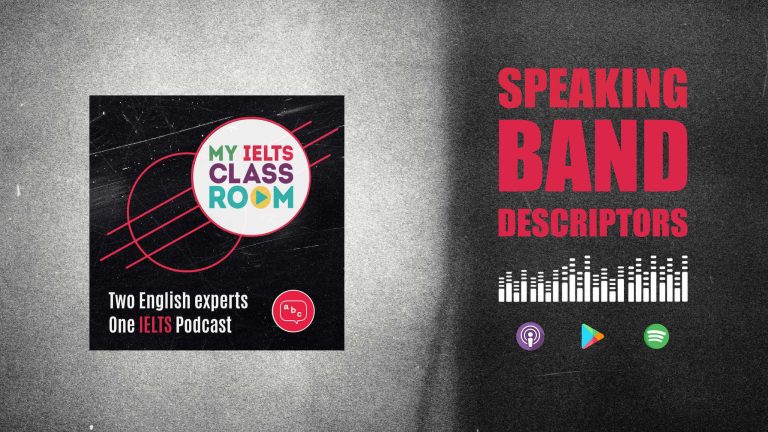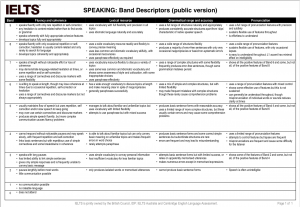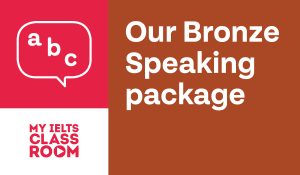
Understanding the IELTS Speaking Band Descriptors
Hey! In your speaking test, the examiner will use the IELTS speaking band descriptors to give you a score in 4 areas: Fluency and Coherence, Lexical Resource, Grammatical Range and Accuracy, and Pronunciation. But, what exactly is the examiner looking for in your speaking performance to give you a 6, 7, or 8 in each of these areas? As always, the answer is in the Band Descriptors!
Today, Nick and I use our experience as teachers to explain each of the marking criteria in detail and point out where many students “go wrong”. If you are new to IELTS and want an introduction to the test, then maybe listen to our IELTS Speaking 101 lesson first!
This is a Patron Only Episode: Click here to support the show and gain access to the audio or continue reading about the speaking band descriptors in the blog post below

https://www.patreon.com/myieltsclassroom
Below, you can find a summary of the episode, which includes all of the links to useful materials and the times of each part of the discussion (so you can go directly to the part you want to listen to). You can also find every episode of the podcast here 🚀
Subscribe to My IELTS Classroom podcast on Apple podcasts here
Subscribe to My IELTS Classroom on Google podcasts here
Podcast Summary: Understanding the IELTS Speaking Band Descriptors
00:00 – 05:26 Introduction (Nick has lost more weight after our motivation challenge – I haven’t)
Nick and I chat about how popular our IELTS Motivation Challenge episode has been and how much we have kept up with our own personal challenges.
05:27 – 08:28 How is your IELTS speaking score calculated?
Just like the writing exam, the examiner will give you a score of 0 to 9 in 4 areas: fluency and coherence, lexical resource, grammatical range and accuracy, and pronunciation.

These scores will then be addd together and divided by four to calculate your final score. As lexical resource and grammar are assessed using more or less the same criteria as for writing, and we spent a long time discussing those in our IELTS writing episode, why don’t we look at those first?
08:29 – 19:59 IELTS Speaking Band Descriptors: Lexical Resource
The IELTS speaking band descriptors for lexical resource differentiate between students in three main areas:
- if your vocabulary is wide enough to discuss a topic at length
- if you have some less common and idiomatic vocabulary
- if you are able to paraphrase effectively
We will discuss this in the episode, but in short, for a 6.0 you are going to be able to talk about topics at length, but will still have some inaccurate word choice and lack some more idiomatic expressions. In other words, you will have the vocabulary necessary to discuss the topics, but you probably can only give fairly basic answers.

By basic I mean descriptive, so you are probably going to be able to do well in Part 1 and Part 2 where you talk about your own life and experiences, but struggle in Part 3 when you have to talk about more abstract topics.
As I said before, for lexical resource, the IELTS speaking band descriptors are exactly the same as for writing, with only one main difference – obviously, in the speaking exam we are not going to test your spelling, but we are going to test your ability to paraphrase.
 And for me (Shelly), lack of paraphrasing is the most common problem that I see for lexical resource. Even high-level students pause when they do not know a word rather than calmly describing the word that they are missing. If you do this, then you should read my blog post about how to paraphrase effectively.
And for me (Shelly), lack of paraphrasing is the most common problem that I see for lexical resource. Even high-level students pause when they do not know a word rather than calmly describing the word that they are missing. If you do this, then you should read my blog post about how to paraphrase effectively.
 For Nick, the main problem he seems with lexis was inaccurate use of idiomatic lexis. You cannot learn three or four fixed expressions like “Look a gift horse in the mouth” or “As far as I am concerned from my viewpoint” and expect to get a 7.0. We are looking for topic specific lexis that is used appropriately – you can’t fake that!
For Nick, the main problem he seems with lexis was inaccurate use of idiomatic lexis. You cannot learn three or four fixed expressions like “Look a gift horse in the mouth” or “As far as I am concerned from my viewpoint” and expect to get a 7.0. We are looking for topic specific lexis that is used appropriately – you can’t fake that!
20:00 – 29:35 IELTS Speaking Band Descriptors: Grammatical Range and Accuracy
The IELTS speaking band descriptors for grammatical resource really differentiate between students in one main area – complex sentences. There is no punctuation in speaking, so you don’t have to worry about commas anymore! You will just need to be able to show the examiner that you can use a range of complex sentences accurately i.e. without error.
If you want to know examples of Band 6, Band 7, and Band 8 grammar structures, then you can, again, look at the blog post for our “Why am I stuck at a 6.5 for IELTS writing?” episode, where we discussed this in detail.
 The main error that I see with grammatical range and accuracy in speaking was inaccurate use of tense. When you write essays, you more or less only ever need to use the present simple. In the speaking exam, you are going to have to use a mix of past, present and future tenses, and this can be a problem for even high-level students, so make sure you spend some time revising this before your test.
The main error that I see with grammatical range and accuracy in speaking was inaccurate use of tense. When you write essays, you more or less only ever need to use the present simple. In the speaking exam, you are going to have to use a mix of past, present and future tenses, and this can be a problem for even high-level students, so make sure you spend some time revising this before your test.
 For Nick, the main problem is a lack of complexity. When students write, they are aware of the complexity of their language, but students can slip back into only simple sentences when they speak. In part 3, pay close attention to the type of language that you are being asked to provide.
For Nick, the main problem is a lack of complexity. When students write, they are aware of the complexity of their language, but students can slip back into only simple sentences when they speak. In part 3, pay close attention to the type of language that you are being asked to provide.
29:36 – 47:45 IELTS Speaking Band Descriptors: Fluency and Coherence
This is the first of the four band descriptors that is uniquely for speaking. So, what do fluency and coherence mean? Well, fluency is how well you can continue speaking without hesitation, and coherence is how well you can be understood (and to be clear, this is not in terms of pronunciation, but in terms of language). The IELTS speaking band descriptors for fluency and coherence differentiate between students in four main areas:
- how often you pause for LANGUAGE
- how willing you are to speak at length
- how relevant your ideas are
- how well your ideas are connected with discourse markers
In short, if you want a 7.0 then you will have to make sure that you rarely pause to access language. It is absolutely OK to pause in the middle of a sentence to gather your thoughts or think of an opinion, but if you stop to search for a word, then this is not OK (and is the main reason why you should PARAPHRASE).
If you are given a difficult question, I would recommend that you pause to think of ideas before you start speaking so the examiner is 100% sure this is why you are delaying answering (you can read more about how to stall for time here).

You also have to show the examiner that you are willing to talk. The examiner can only give you points for what you say and this means giving an extended answer no matter what the question is! This might be a problem if you are a young learner (I know some teenagers feel shy in the exam) or if you are an older student who finds the questions a bit strange.
Remember, you are in a test not having a conversation in a cafe (although it should feel like one), so no matter what your personal opinion really is about the topic you have been asked to discuss – just discuss it!
Many students ask me if self-correction is a good idea. The answer is a big YES! If you realise that you have made a grammar, vocabulary or pronunciation error, then it is a great idea to quickly self-correct.
Obviously, if you do this in every sentence, it will affect your score for fluency and coherence, but once or twice is great!
In terms of relevancy, the difference between a 7.0 and an 8.0 is having answers that are relevant, even for the difficult Part 3 questions. Many students are very fluent and very willing to talk in Parts 1 and 2, but fall apart in Part 3 when the philosophical questions are asked. So, if you are aiming for a very high score and can already speak without effort, then you should put effort into making your answers in that section relevant. Honestly, some of this is about ideas, so practice really does make perfect.
 For Nick, the main problem he see with fluency and coherence is an overuse of discourse markers. Yes, we want to use phrases that join our sentences together like “obviously” or “basically” or “I think another relevant point is”, but we want to see these expressions used NATURALLY. You don’t want to start the exam like this:
For Nick, the main problem he see with fluency and coherence is an overuse of discourse markers. Yes, we want to use phrases that join our sentences together like “obviously” or “basically” or “I think another relevant point is”, but we want to see these expressions used NATURALLY. You don’t want to start the exam like this:
Examiner: Do you live in a house or a flat?
Test-taker: Well, let me start by saying that I live in a flat.
For me, it is students being unable to continue speaking without pausing for language. This is usually because their level of English is Upper Intermediate. If you need a 6.0, then this is fine, but if you are aiming for a higher score, then honestly the best way that you can improve is to take some time out from IELTS to focus on your language.
 For higher-level students, the main problem can be speaking too quickly. Yes, we want you to be fluent and not to pause to access language, but you have to be careful that you don’t speak too fast. This is a natural thing to do when you are nervous, but it can make it hard for the examiner to understand you if you are speaking at a million miles an hour, particularly if you have a strong accent. So, practice speaking quickly but CLEARLY.
For higher-level students, the main problem can be speaking too quickly. Yes, we want you to be fluent and not to pause to access language, but you have to be careful that you don’t speak too fast. This is a natural thing to do when you are nervous, but it can make it hard for the examiner to understand you if you are speaking at a million miles an hour, particularly if you have a strong accent. So, practice speaking quickly but CLEARLY.
47:48 – 1:043.48 IELTS Speaking Band Descriptors: Pronunciation
Let me start by saying that examiners do NOT expect you to have a British or American accent to get a high score for pronunciation – this is a common misconception and one that I want to stop right now! So what is the examiner looking for here? The IELTS speaking band descriptors for pronunciation differentiate between students in two main areas:
- can you generally be understood (even if some words are mispronounced)
- can you show a range of pronunciation features (i.e. intonation, stress on important words, etc).
 The most common problem I see with pronunciation is very simply students mispronouncing single words. Now, if you do this but the word remains clear, this will not stop you getting a 7.0. For example, many students pronounce “clothes” as two syllables “clo-thes” instead of one, but this does not impede communication and so is a minor error (one that stops an 8.0 not a 7.0).
The most common problem I see with pronunciation is very simply students mispronouncing single words. Now, if you do this but the word remains clear, this will not stop you getting a 7.0. For example, many students pronounce “clothes” as two syllables “clo-thes” instead of one, but this does not impede communication and so is a minor error (one that stops an 8.0 not a 7.0).
However, if you mispronounce a word so badly that I am unable to follow your speech, then that will limit you to a 6.0 for PR. You should be particularly careful of minimal pairs. These are sounds that alter the meaning of words when changed. For example:
/l/ and /r/ like in the words light and right
/b/ and /v/ like in the words very and berry
/b/ and /p/ like in the words bet and pet
If one sound in the minimal pair does not exist in your language, then you are going to hear and possibly speak these sounds in the SAME WAY. If you are Japanese, the words light and right sound the same as there is no difference in Japanese between /l/ and /r/ and you will have to work very hard to make these sounds clear. What English sounds do not exist in your language? Find out and make sure you can pronounce the minimal pairs correctly.
 For Nick, the main problem is lack of intonation across a sentence. For a 7.0 or higher, you need to be able to “speak with emotion”. This means that you should use your voice to highlight the words that are important or not important by stressing the important words. Students who are nervous either speak too slowly (like a robot), or too fast (like a machine gun) and this totally destroys your intonation.
For Nick, the main problem is lack of intonation across a sentence. For a 7.0 or higher, you need to be able to “speak with emotion”. This means that you should use your voice to highlight the words that are important or not important by stressing the important words. Students who are nervous either speak too slowly (like a robot), or too fast (like a machine gun) and this totally destroys your intonation.
If you want to practice your intonation, try saying this simple sentence with emphasis on different words to stress their importance i.e. Say it so that you stress the person you saw (Joan). Say it so you stress the colour of the sweater. Say it so you stress the time.
When I saw Joan last week, she was wearing a blue sweater.
This is a simple exercise, but it should teach you the importance of where you put the emphasis in a sentence. Listening to native speakers talking naturally is a great way to learn this. Pausing and imitating native speakers is even better.
Remember, you are not copying the accent, but the “music” or “sentence stress”. This may feel strange at first, but it really can make a big difference to your intonation relatively quickly. Remember, language is music, so the quicker you learn the rhythm of English the better. If you want a way to start, listen to The Daily podcast – the present has the clearest sentence stress that I have ever heard!
1:043.49 – END – Our final advice!
Be natural and get the balance right between fluency and grammar / lexis!
Would you like expert help to improve your IELTS speaking score?
We offer a 5-day intensive course for IELTS test-takers every month that covers all aspects of speaking, from how to approach each section to how to paraphrase well or address the most difficult questions in Part 3. Even better, with every course being run by an ex-examiner, you will be getting feedback is guaranteed to help you to improve your score. You can read more about the course here.

